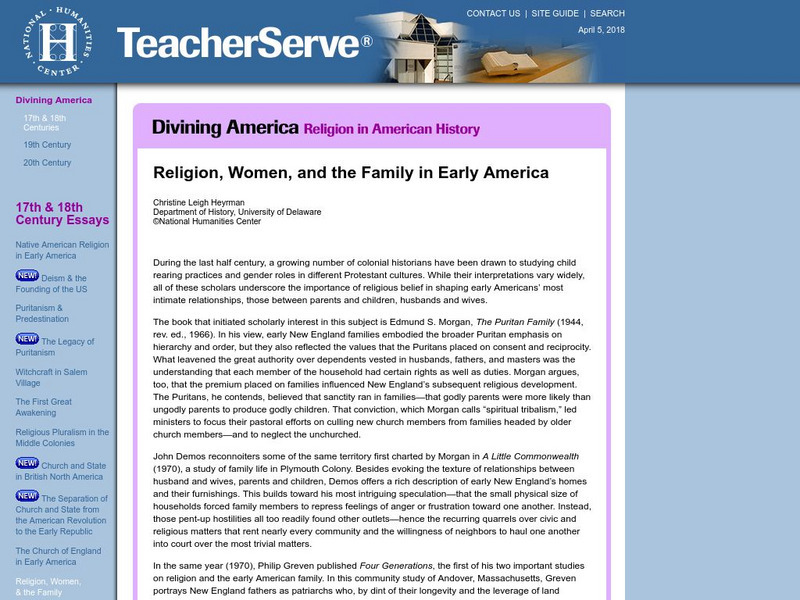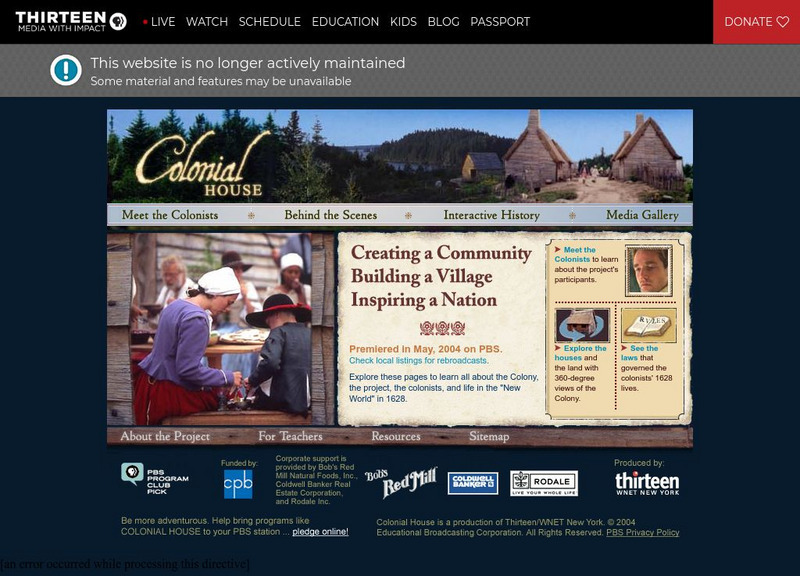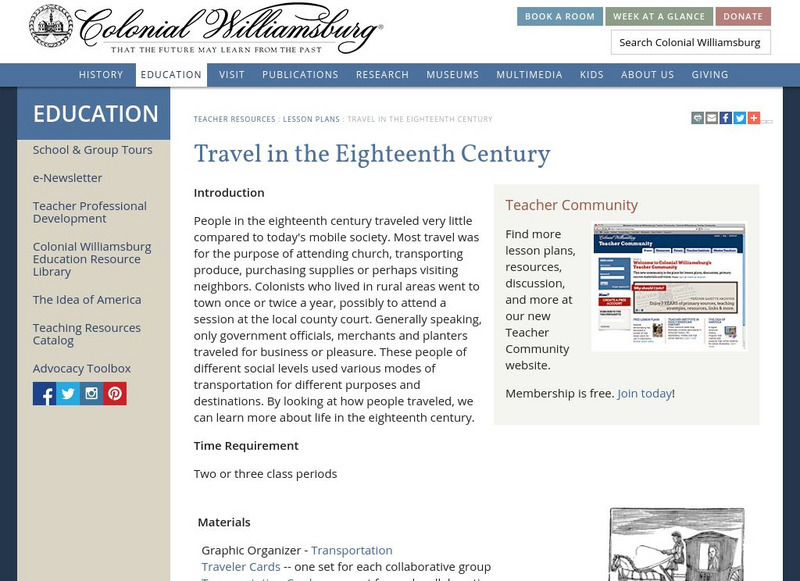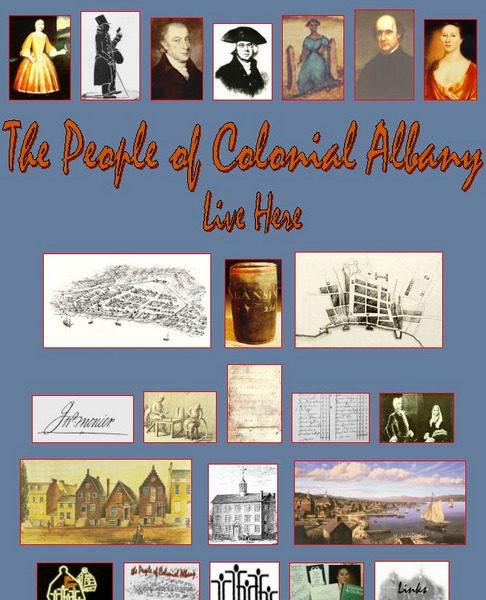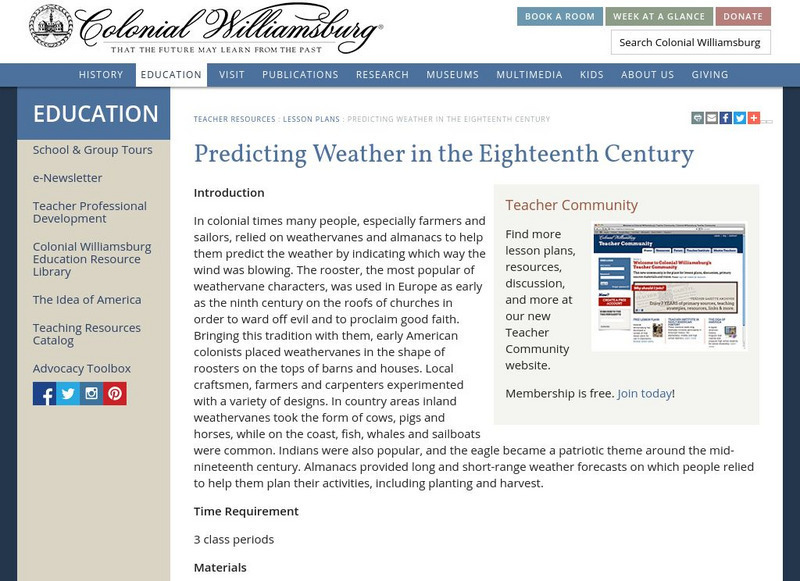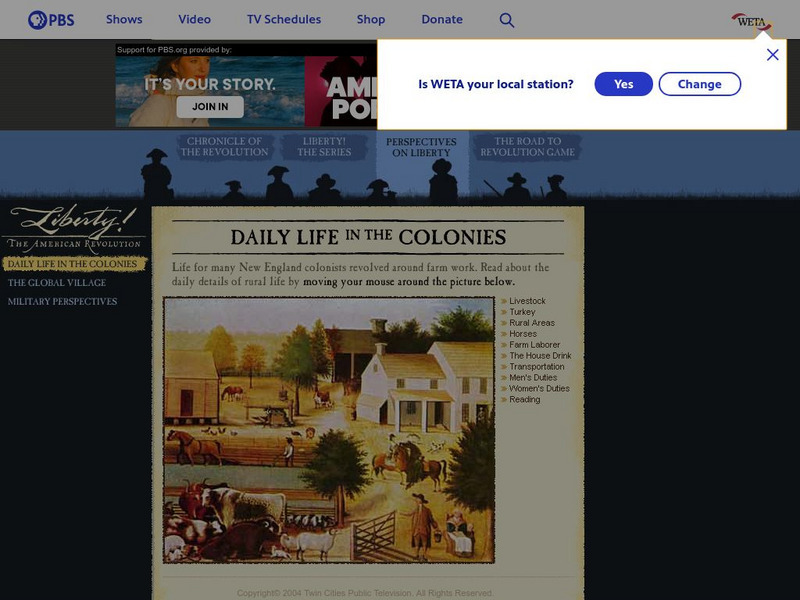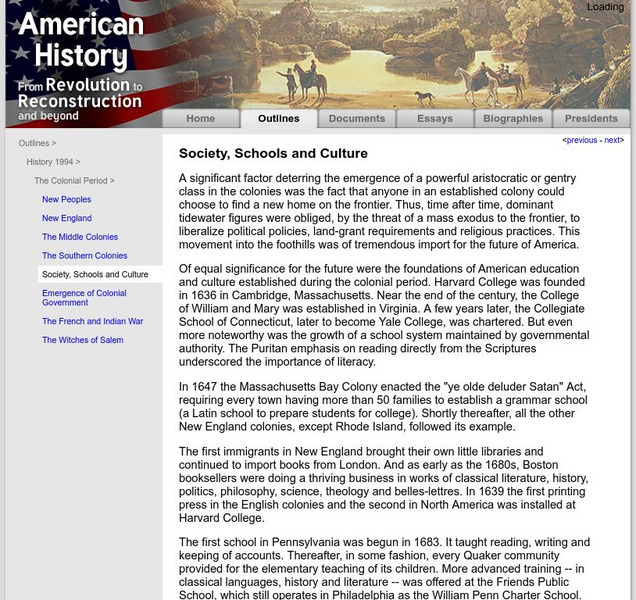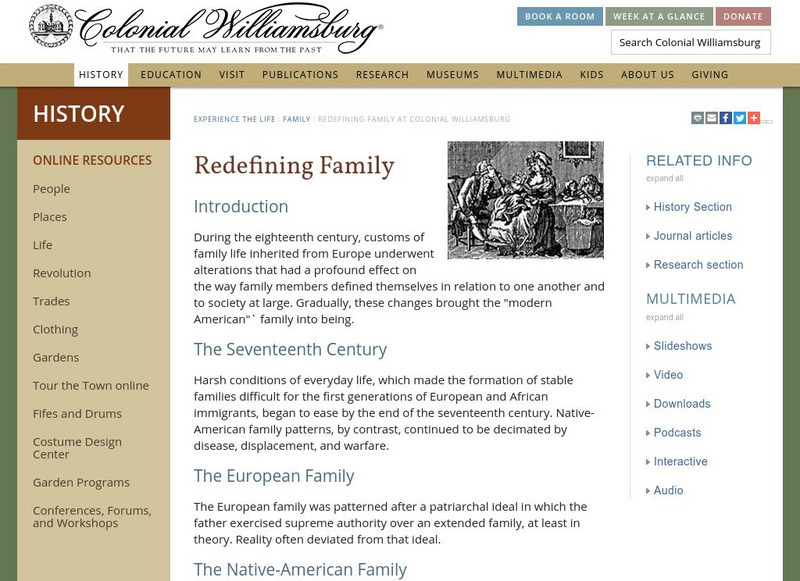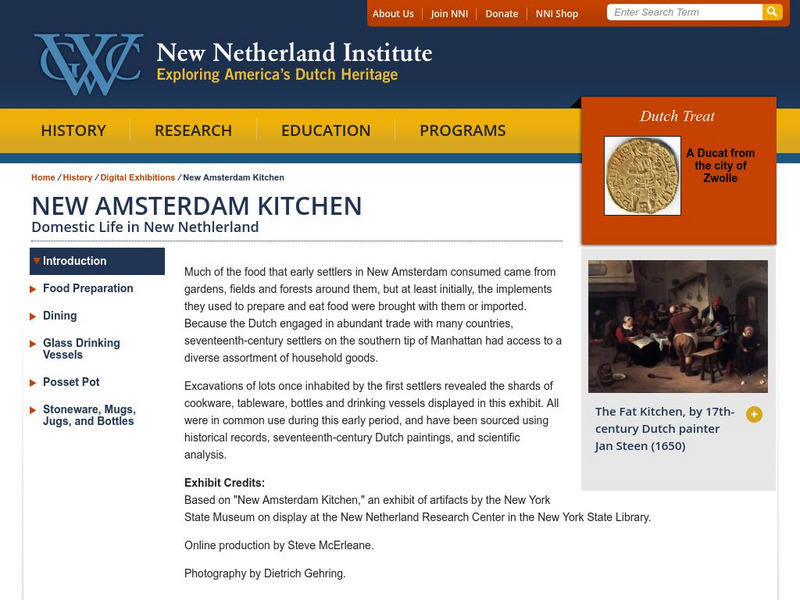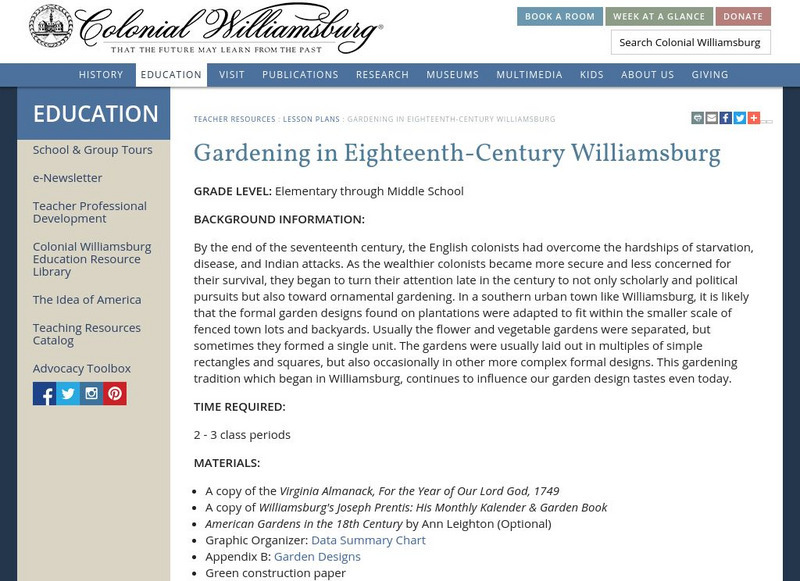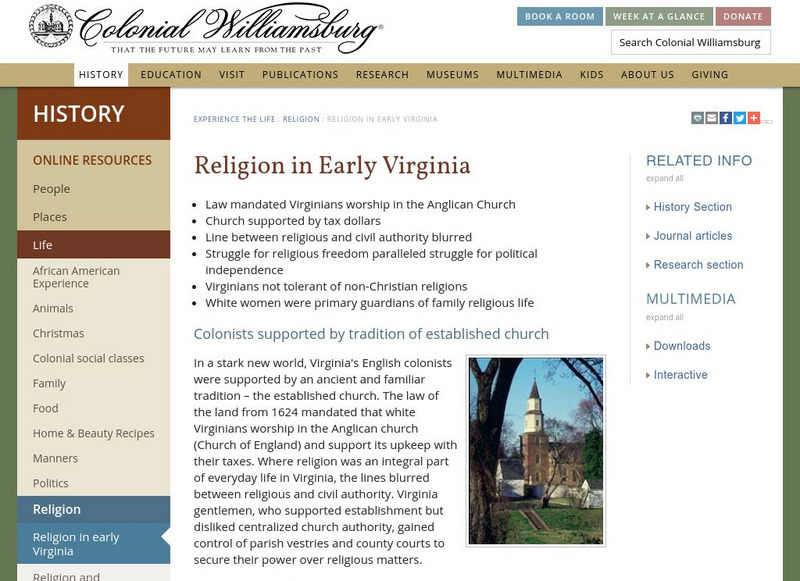National Humanities Center
National Humanities Center: Teacher Serve: Religion, Women, and the Family
This National Humanities Center site from the University of Delaware discusses family life, childrearing, and the importance of religion in colonial America as written about in various books.
PBS
Wnet: Thirteen: Colonial House
Companion website for Colonial House, a televised experiment in historical reenactment, provides information and insight about what daily life, in 1628, must have been like for English settlers in early America. With video clips from the...
University of Maryland
Umbc: Children's Lives at Colonial London Town
A digital storybook called Children's Lives at Colonial London Town: The Stories of Three Families. London Town is located in Anne Arundel County, Maryland, and was a trading port in 18th century colonial America. There is an...
Colonial Williamsburg Foundation
Colonial Williamsburg: Politics in Colonial Virginia
This site explores the politics involved in Colonial Williamsburg, leading up to the American Revolution. Content focuses on famous speeches, documents, and influential people.
PBS
Wnet: Thirteen: Colonial House: For Teachers: 'Tis a Very Dirty Manner of Life
Interactive adjunct to the popular PBS series Colonial House, which follows the efforts of modern-day families attempting to live as early colonists in seventeenth-century Maine, focuses on the language and expressions common to that...
Books in the Classroom
Carol Hurst's Children's Literature Site: Colonial America
A detailed resource of recommended children's books on Colonial America, including discussion and research starters, teaching activities, and title suggestions.
The History Cat
The History Cat: History of Colonial America: The Thirteen Colonies
Compares life in the three regions of the thirteen British colonies - the New England colonies (Massachusetts, New Hampshire, Rhode Island, and Connecticut), the Middle Colonies (New York, Pennsylvania, Delaware, and New Jersey), and the...
Colonial Williamsburg Foundation
Colonial Williamsburg: Travel in the 18th Century
This site has a lesson plan that contrasts the methods of travel during Colonial Times, with those of today.
Colonial Williamsburg Foundation
Colonial Williamsburg: Colonial Religion
The site provides a detailed overview of role religion played in the lives of the colonists. Content explores how religion played a part in the Revolution, and the statute for religious freedom, as well as providing a lesson plan, a link...
Other
New York State Museum: Colonial Albany
Provides information about life in the colonial village of Albany. Includes many resources about important structures, happenings, and people. A great resource for information on colonial America as a whole.
The History Cat
The History Cat: History of Colonial America
Information about the history of the colonization of America. Read about Jamestown, Plymouth, the Salem witch trials, colonial life, and the Thirteen Colonies.
University of Notre Dame
Department of Special Collections: Colonial Currency
This resource from the Notre Dame University provides a comprehensive look at the currency of colonial America. Includes pictures and explanations of currency, lottery tickets and fiscal documents. All are listed chronologically by colony.
Colonial Williamsburg Foundation
Colonial Williamsburg: Predicting Weather
Site from the Colonial Williamsburg Foundation combines Science and Social Studies. As students examine the various methods of predicting the weather, in Colonial Williamsburg.
Scholastic
Scholastic: Teaching With Dear America: Colonial Period
Activities useful in presenting American colonial life. Find references to novels, a colonial home, and a diary entry activity.
PBS
Pbs Liberty!: Daily Life in the Colonies
Click on an object in the picture to learn more about its use and role in the colonies during the 18th century. Some things to learn about include, livestock, labor, and travel.
University of Groningen
American History: Outlines: Colonial Period Society
This site provides an explanation of the influence of the frontier on the landed gentry and the role of education in the society.
Colonial Williamsburg Foundation
Colonial Williamsburg: Redefining Family
This site from the Colonial Williamsburg Museum explores the different "families" of colonial Williamsburg. Content includes a focus on each cultural group: white, Native American, and black.
McGraw Hill
Mc Graw Hill: Colonial Economy and Patterns of Society
Although tied to pages from a specific text, these AP study questions allow anyone to consider aspects of colonial economics. (Answers to some of the questions are located at the following link:...
PBS
Pbs Learning Media: Colonial House
Colonial House video segment in which Colonists and the Passamaquoddy people encounter each other for the first time in a reenactment of a New England settlement in 1628. [4:38]
PBS
Pbs Teachers: Benjamin Franklin: An Extraordinary Life (Teacher's Guide)
Go directly to the teaching resource that accompanies the PBS series "Benjamin Franklin: An Extraordinary Life, An Electric Mind" to find eight lesson plans that support the study of Benjamin Franklin and his place in history. Lessons...
Colonial Williamsburg Foundation
Colonial Williamsburg: The Two Williamsburgs
This lesson plan on daily life in Colonial Williamsburg challenges students to compare and contrast the lives of the African and European populations.
Other
New Netherland Institute: New Amsterdam Kitchen: Domestic Life in New Netherland
Provides information about the foods eaten by settlers in New Amsterdam and how they prepared it. Describes the different utensils and dishes that were used for cooking and for food consumption.
Colonial Williamsburg Foundation
Colonial Williamsburg: Gardening in the 18th Century
Site offers students the opportunity to design their own gardens. Several disciplines can be used through this imaginative group lesson.
Colonial Williamsburg Foundation
Colonial Williamsburg: Religion in Early Virginia
This examination of religion in Virginia gives you an idea of where Anglicanism fit into colonial life there.


